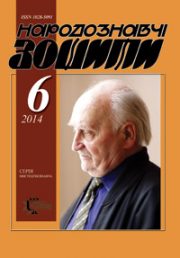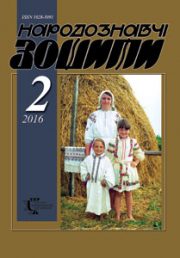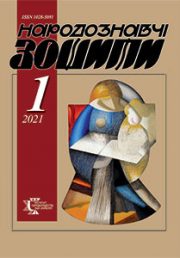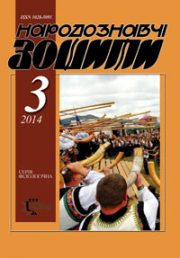The Ethnology Notebooks. 2023. № 3 (171), 659—664
UDK 811.161.2’282.3(477.83-22НижняЯблунька)’373.23
DOI https://doi.org/10.15407/nz2023.03.659
UNOFFICIAL PERSON IDENTIFICATION IN THE SPEECH OF THE VILLAGE NYZHNІA YABLUNKA
HODOVANETS Nazar
- ORCID ID: https://orcid.org/0009-0008-9143-8353
- Postgraduate Student,
- Ivan Franko National University of Lviv,
- Department of Ukrainian Language named after professor Ivan Kovalyk,
- 1, Universytetska Str., 79001, Lviv, Ukraine,
- Contacts: e-mail: nazar.hodovanets@lnu.edu.ua
Abstract. The article examines the unofficial anthroponymy of the village of Nizhnia Yablunka (Sambir district, Lviv region). The importance of the work is determined by the need to analyze unofficial names of people both for professional linguistic study and for the perception of the peculiarities of local tradition through the prism of onymic nomination. Surnames and family names of local residents occupy an extremely important place in the lexical composition of the language. The priority aspect of the analysis is the lexical-semantic base of motivation of local nicknames and family names of Boyky. The work elucidates the motives and functions of unofficial anthroponyms in the studied settlement. According to the lexical-semantic motivational base local unofficial anthroponyms of Nizhnia Yablunka are traditionally divided into appellative and homonymous with a significant predominance of the second group. The analyzed nicknames, which were formed over a long period of time, are an important indicator of the development of both Ukrainian anthroponymy and the national linguistic picture of the world. Unofficial anthroponymy is a unique linguistic and sociocultural phenomenon, because it organically combines onimological and ethnocultural components. Unofficial names of people are the object of various aspects of linguistic, geographical, ethnological, sociological, folkloristic interests. However, there are still many problematic issues related to this layer of Ukrainian anthroponymy. They are the potential for further professional development. Another important argument for the relevance of the research is the limited area of functioning of the studied material, which proves the perspective of future scientific explorations.
Keywords: onym, anthroponym, unofficial anthroponymy, nickname, onymic identification, onymic identity, Nyzhnia Yablunka.
Received 5.05.2023
REFERENCES
- Shynkaruk, V. (2002). Philosophical encyclopedic dictionary. Kyiv: Abrys [in Ukrainian].
- Shapar, V. (2007). Modern explanatory psychological dictionary. Kharkiv: Prapor [in Ukrainian].
- Melnychuk, O. (1974). Dictionary of foreign words. Kyiv: URE [in Ukrainian].
- (1973). Dictionary of the Ukrainian language: in 11 vol. (Vol. 4). Kyiv: Naukova dumka [in Ukrainian].
- Antoniuk, O., Volobuiev, V., & Holovatyi, M. (2005). Small ethnopolitical dictionary. Kyiv: MAUP [in Ukrainian].
- Matsiuk, H. (2014). About the nature of the interaction of language and identity in Ukraine (based on the material of the urban urban icon of the Soviet and post-Soviet periods). Ukrainian-centrism of the scientific conscience: a collection of scientific works in honor of Professor Zenovii Terlak (Pp. 539—565). Lviv: Prostir-M [in Ukrainian].
- Karpenko, O., & Neklesova, V. (2022). Cosmonym component of Ukrainian onymic identity. Notes on Ukrainian linguistics (Issue 29, pp. 55—68) [in Ukrainian]. DOI: https://doi.org/10.18524/2414-0627.2022.29.262346.
- Chuchka, P. (2008). Anthroponymy of Transcarpathia. Kyiv: Papirus [in Ukrainian].
- Khudash, M. (1977). From the history of Ukrainian anthroponymy. Kyiv: Naukova dumka [in Ukrainian].
- Onyshkevych, M. (1984). Dictionary sayings of Boyky (Part 1). Kyiv: Naukova dumka [in Ukrainian].
- Onyshkevych, M. (1984). Dictionary sayings of Boyky (Part 2). Kyiv: Naukova dumka [in Ukrainian].







